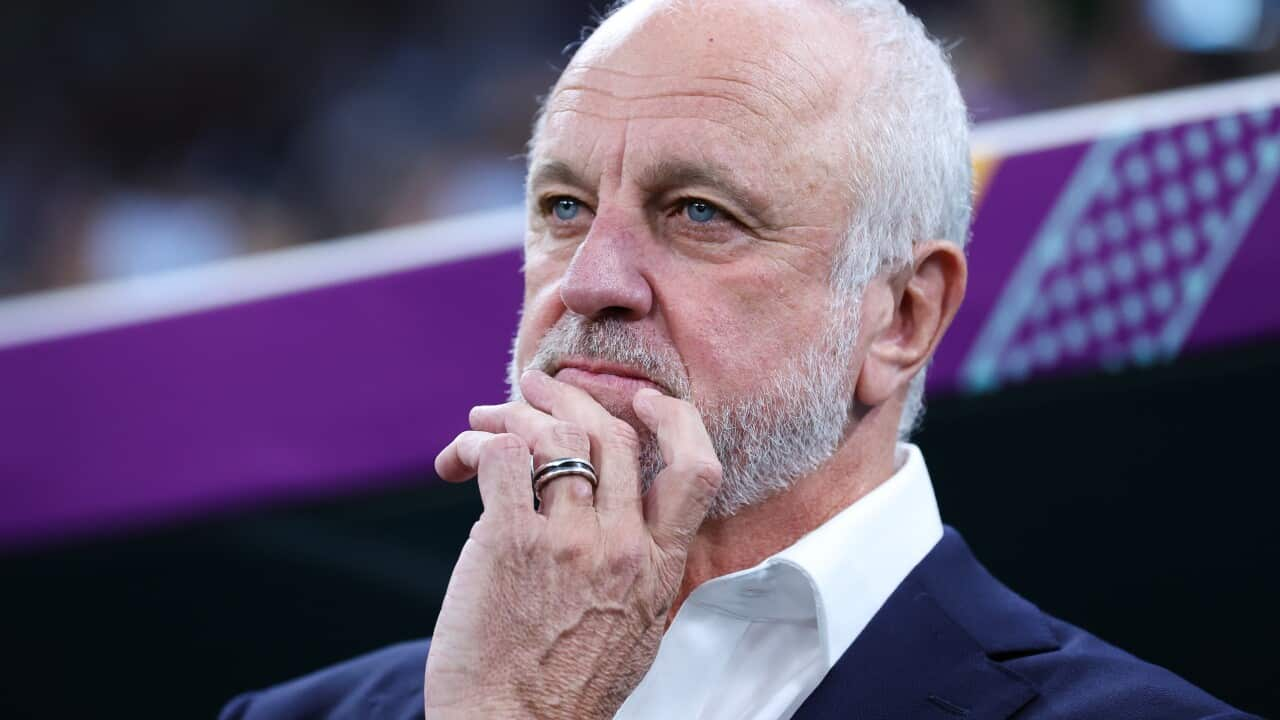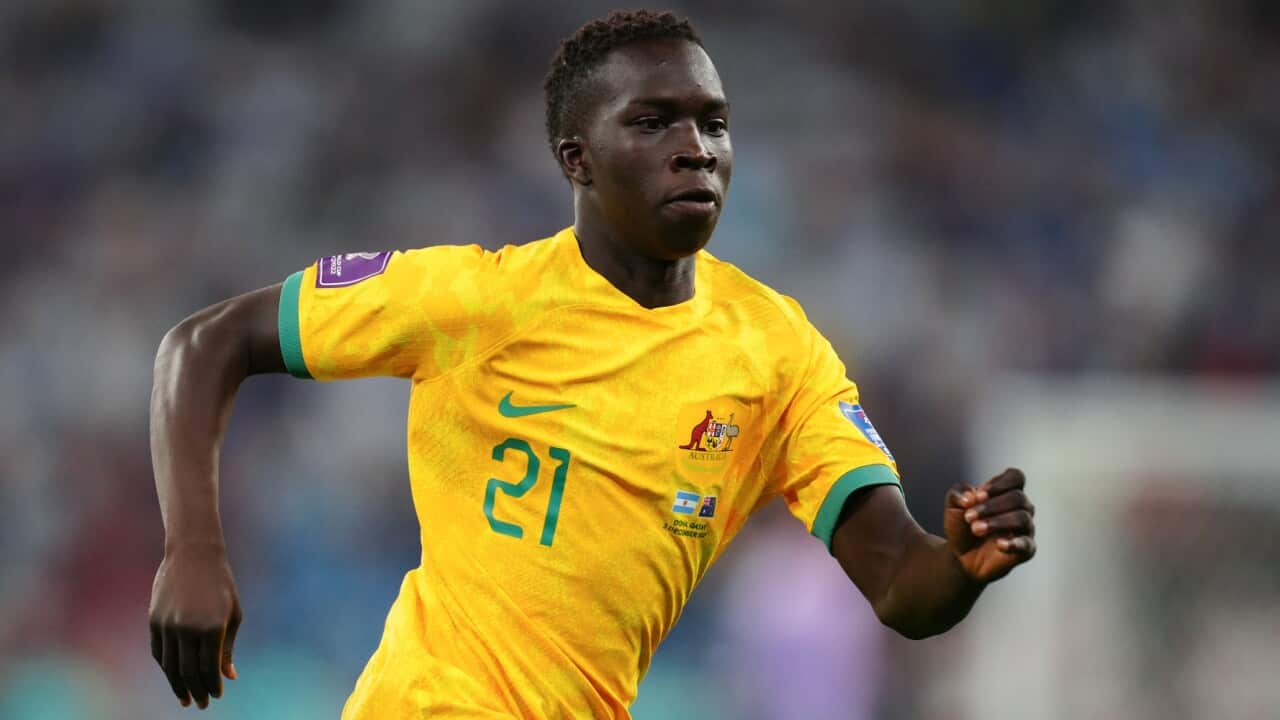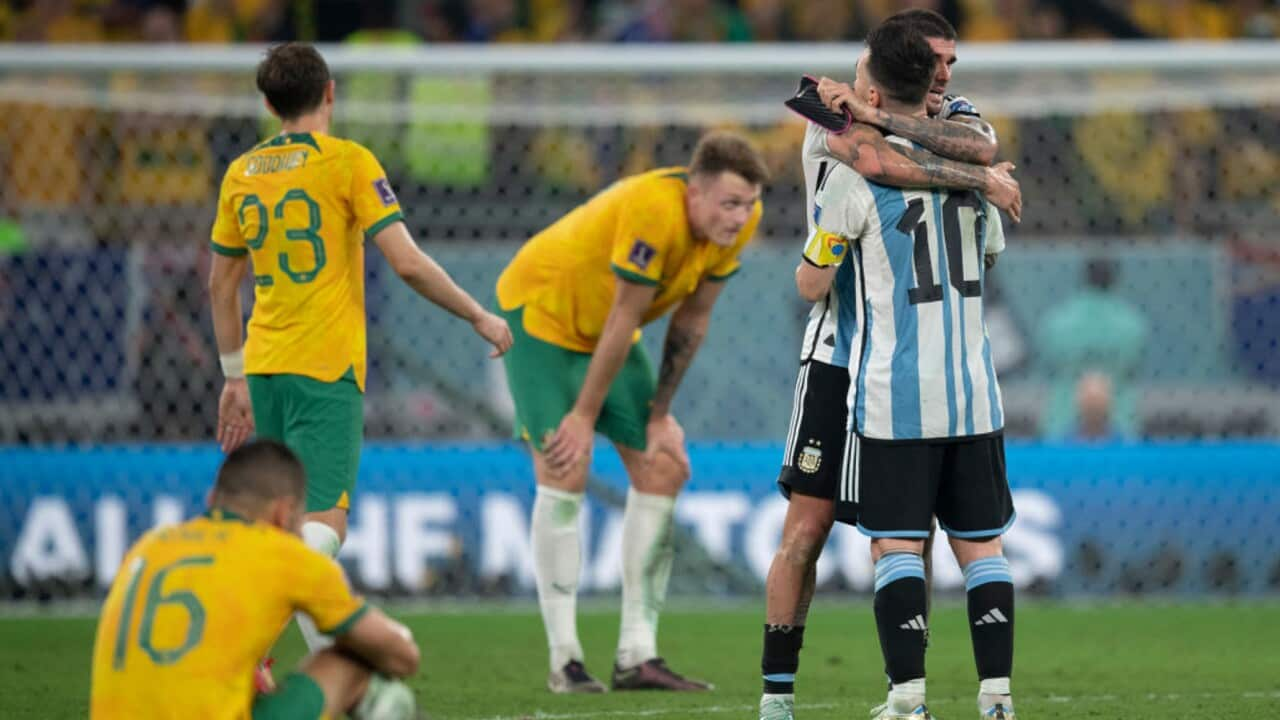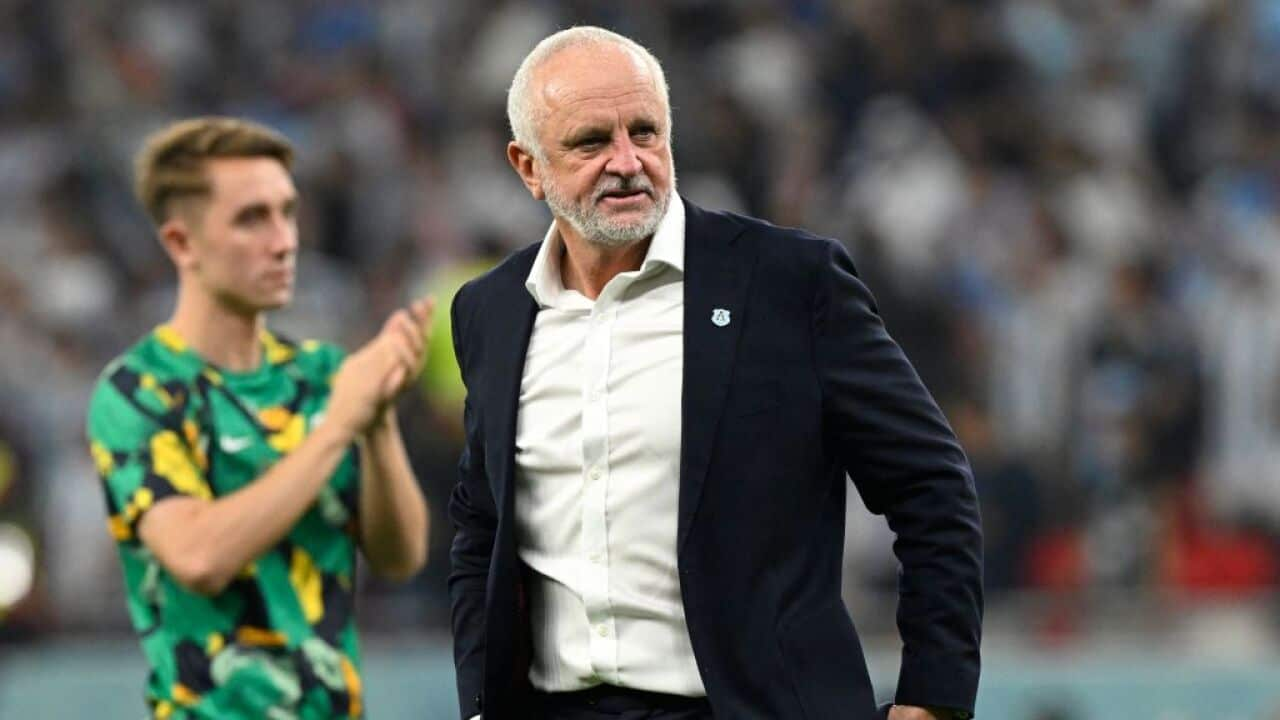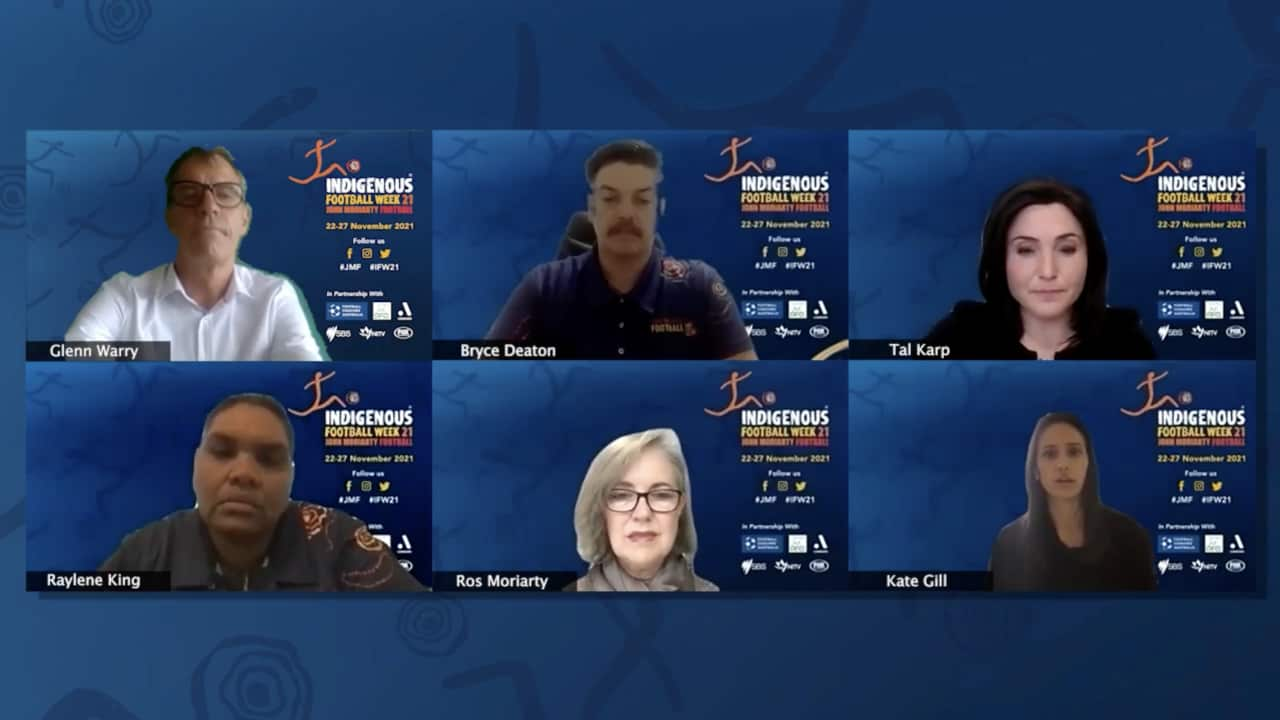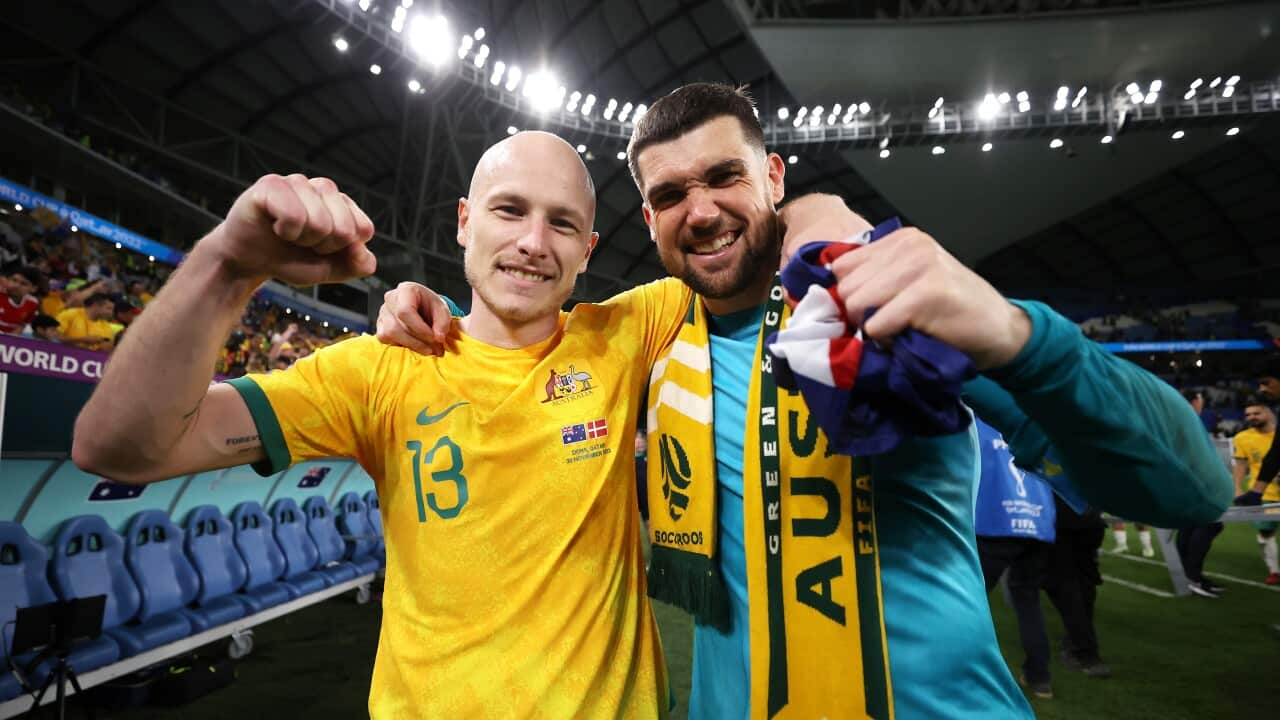Create your to stream all 64 matches of the FIFA World Cup 2022ᵀᴹ live and free any time on your favourite device.
While the nation now mostly recognises head coach Graham Arnold's tenure as the Australian mens team head coach a succes, and with the Socceroos the current sporting heroes of Australian popular culture, it was far from the case in March. Australia’s qualification hopes hung by a very thin thread and with it Arnold's job security.
A draw with Oman and subsequent losses to Japan at home and Saudi Arabia away saw the Socceroos fail to directly qualify and instead have to endure the gauntlet of two sudden-death play-offs against the United Arab Emirates and Peru.
James Johnson sat down with SBS analyst Craig Foster in the SBS Sydney studios to talk about the national teams in the wake of the Australian men’s team’s performance in Qatar. He directly addressed just how close Arnold was to being fired at that point, with the match against Saudi Arabia crucial to the head coach retaining his position.
“It’s always complex. Graham was under a lot of pressure in the March window,” said Johnson. “We didn’t beat Japan at home, that was disappointing and then we didn’t beat Saudi. I said to Graham before the Saudi match, ‘relax, what we need from you is to see that the players will go out and play for you, that’s what’s important’. Because we need to see he had control of the locker room.
“Although we didn’t win that game against Saudi, it proved to us that the players really played for Arnie. That’s why we came out strongly after that match and backed Arnie in.”
From the other side of the World Cup, that looks like a good decision, and now Football Australia is going through the process of evaluation and what lessons have been learned from the World Cup.
“I’m very happy with our performance at the World Cup and I’m very excited for what’s ahead,” said Johnson. “Over the next month, we’ll do planning and put in place a new coach and other position in the team environment and start building out the international windows that we control, which we’ll have four of in 2023.”
That ‘new’ coach won’t necessarily not be Arnold, but with the Socceroos’ head coach contract coming to an end after the World Cup, he’ll need to be re-signed, likely at a higher salary, as Johnson recognised.
“We’ve promised Graham that we won’t go to market now,” said Johnson.
“It’s been a very tough few years for Graham and his wife, Sarah, so he’s in the UK at the moment having some time off. When he gets back we’ll take some time and sit down and work out a way forward.
“Graham’s value has increased, because of his performance at the World Cup, but so too has the Socceroos’ and the Australian football brand. We’ve come off a great campaign and we’re going forward into a Women’s World Cup on home soil. We’ve got a fantastic (men’s) team and a lot of that team will be peaking in 2026.”
Building on momentum from the Men’s World Cup into the home Women’s World Cup was identified as key for Johnson both for administration strategy and from a footballing standpoint. The Matildas have been on the end of a few drubbings in recent years, but the overall tenor of the results has turned around in more recent times, with the main goal in sight.
“I don’t want to put too much pressure on the players, but I will say that this is a fantastic team of players,” said Johnson of the expectations the public should have for the home team's World Cup performance. “They’re a fantastic team on the pitch, they’re a fantastic team off the pitch, we’ve put them through the most difficult schedule of any national team in the world by far.
“They have played nearly every top-10 team in the world over the past two years. It was difficult at first, we lost 5-0 to Germany, we lost 5-0 to the Netherlands, but that was designed to make sure that we were playing these teams regularly.
“When you look at our history, we would get to the Round of 16 at tournaments and we weren’t doing so well against those teams. We knew that we didn’t have enough depth, and when you’re going into the seventh game of the World Cup, you need depth.
“Players will get injured, players will get suspended and I think something that you’ve seen now is that it is a team that does have depth. We’re very happy with where the team is and we want to be peaking on July 20, when we kick off the tournament.”
Performance on the pitch isn’t the only thing that Football Australia has to manage within its relationship with the national teams. The recent World Cup saw players express themselves in the human rights space, with Australia, as a team, calling for decriminalisation of same-sex relationships in Qatar ahead of the tournament.
Football Australia issued a statement on the same day, supporting the players, and also acknowledging "significant progress and legislative reforms" within Qatar.
“We went through a long consultation process with Amnesty, ILO (International Labour Organisation), the Supreme Committee in Qatar, we spoke with our players, our government, the player’s association and with FIFA quite often,” said Johnson. “We wanted to ensure we had open dialogue and we wanted to support the players.
“When the players issued the statement, we wanted to ensure we released the statement on the same day and that there was consistency in what we were saying because we didn’t want the players to be hung out. We’re the only federation in the world to put a clear statement.
“We said that there’s obviously been progress in Qatar, but there needs to be better implementation of some of the laws that have been brought into place. We supported the establishment of a migrant workers’ centre and we back our players and that was something that we needed to manage in Qatar because we were the only association that did that. The players were the first group that went out and we’re very proud of that.”
With Australia punching above its weight on the global stage, the question of building the game within Australia is what Johnson went on to discuss, and you can .

